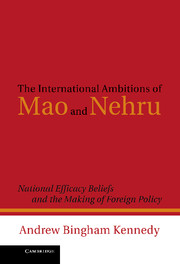Crossref Citations
This Book has been
cited by the following publications. This list is generated based on data provided by Crossref.
Horowitz, Michael C.
and
Stam, Allan C.
2012.
How Prior Military Experience Influences the Future Militarized Behavior of Leaders.
SSRN Electronic Journal,
Horowitz, Michael C.
and
Stam, Allan C.
2014.
How Prior Military Experience Influences the Future Militarized Behavior of Leaders.
International Organization,
Vol. 68,
Issue. 3,
p.
527.
Chang, Cheng-Yun
2016.
Were Those Decisions Righteously Made? The Chinese Tradition of Righteous War and China’s Decisions for War, 1950–1979.
Foreign Policy Analysis,
p.
orw025.
Cohen, Michael D.
2016.
Live and Learn: Availability Biases and Beliefs about Military Power.
Foreign Policy Analysis,
p.
orw050.
ÇINAR, Yusuf
2018.
Çin Halk Cumhuriyeti’nin Çatışma Yönetimi Stratejisi Üzerinden Bir Dış Politika Okuması: 1990-2000 Yılları Arasında Çin-Kuzey Kore İlişkisi.
Anemon Muş Alparslan Üniversitesi Sosyal Bilimler Dergisi,
Vol. 6,
Issue. 3,
p.
333.
Horowitz, Michael C.
Potter, Philip
Sechser, Todd S.
and
Stam, Allan
2018.
Sizing Up the Adversary.
Journal of Conflict Resolution,
Vol. 62,
Issue. 10,
p.
2180.
Kim, Nam Kyu
2018.
Revolutionary Leaders and Mass Killing.
Journal of Conflict Resolution,
Vol. 62,
Issue. 2,
p.
289.
Lerner, Adam B
2019.
Theorizing Collective Trauma in International Political Economy.
International Studies Review,
Vol. 21,
Issue. 4,
p.
549.
SORNARAJAH, Muthucumaraswamy
and
WANG, Jiangyu
2019.
China, India, and International Law: A Justice Based Vision Between the Romantic and Realist Perceptions.
Asian Journal of International Law,
Vol. 9,
Issue. 2,
p.
217.
Dorigné-Thomson, Christophe
2023.
Indonesia’s Engagement with Africa.
p.
203.
Dash, Sarita
2023.
Cultural Dimensions of India’s Look-Act East Policy.
p.
117.
YILDIZ, Adil
2023.
Prior Rebel Experience of Leaders and Its Influence on Physical Integrity Rights.
Aurum Journal of Social Sciences,
Vol. 8,
Issue. 2,
p.
173.
Dorigné-Thomson, Christophe
2023.
Indonesia’s Engagement with Africa.
p.
1.
Jost, Tyler
Kertzer, Joshua D.
Min, Eric
and
Schub, Robert
2024.
Advisers and Aggregation in Foreign Policy Decision Making.
International Organization,
Vol. 78,
Issue. 1,
p.
1.





